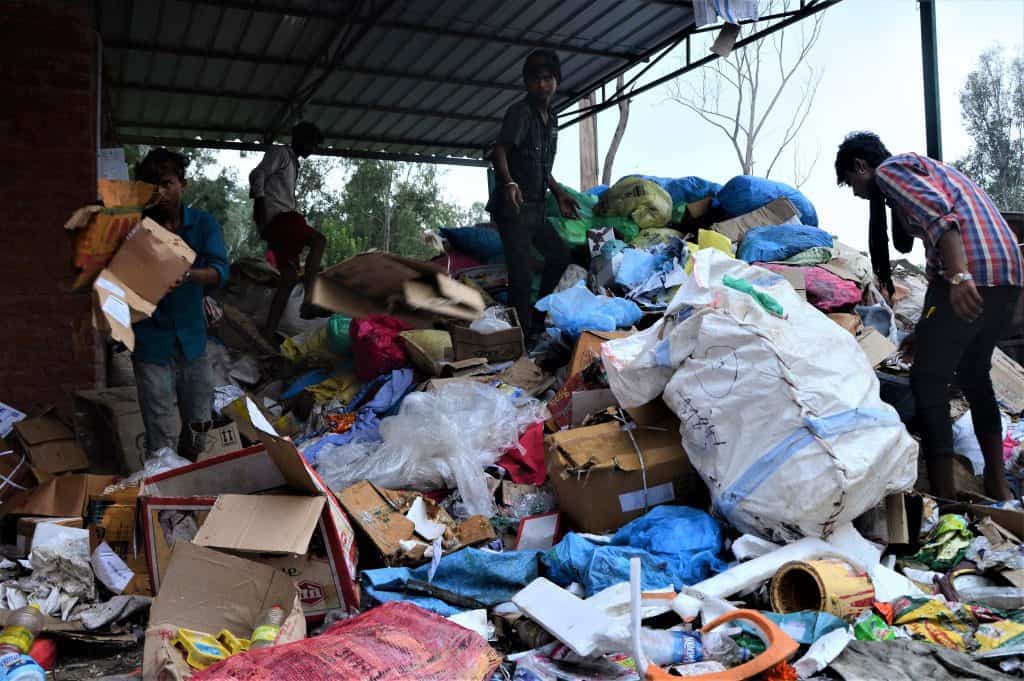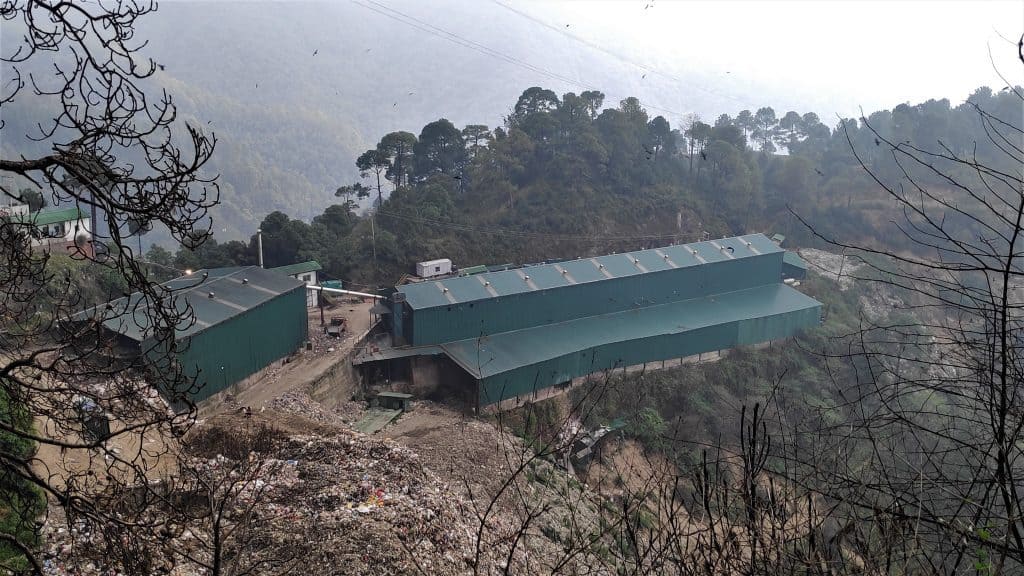Palampur is a picturesque Himalayan town in Kangra district, in the foothills of the majestic Dhauladhar mountains and the gateway to the popular Kullu-Manali tourist destinations. Surrounded by lush green tea gardens growing the famous Kangra tea, which was first planted in Palampur, the town is also home to CSIR’s Institute of Biosource Technology. Sadly, barring some localities and the town’s peripheral belt, the once pretty lanes of this town are today lined with garbage heaps dumped haphazardly at some spots.
“We need to find answers to fix this problem,” said former Chief Minister Shanta Kumar, who hails from Palampur. “The root cause is population growth. Towns are getting over-crowded and the municipal waste generated daily is piling up, making the beautiful hill town look ugly. It is a serious environmental hazard, too, as it contaminates water sources”.
Once a non-issue for old timers like Shanta Kumar, Palampur, which generates about 30 tons of waste daily, is facing a huge waste disposal problem as are the state’s other urban centres. Of the total 52 urban municipal bodies in Himachal Pradesh, two of the biggest municipal corporations, Shimla and Dharamshala, are yet to implement any kind of integrated waste management system.
“The problem is really serious and the Solid Waste Management Rules 2016 need strict implementation,” said Manshi Asher, an environmental researcher associated with Himdhara Collective, an umbrella organisation of green activists. “The rules provide for segregation of waste at source (home) followed by door to door collection. And, if possible decentralised composting. Strict enforcement of the ban on plastics and recycling are options for a long term solution”. With the state having already attained ODF status in 2016, solid waste management is the new focus area, which Himachal Pradesh has identified under the Swachh Bharat Mission (SBM).
A successful experiment
Now, one small panchayat, which is part of Palampur town and not far from Shimla, has shown a way that its big brothers can emulate, to manage waste disposal. Aima panchayat, an urban and rural agglomeration mix of 7000 residents, today has its own modern garbage treatment park located about 8 kms from Palampur, with the facility to handle all kinds of waste, including plastic.
Around 800 garbage collectors, mainly volunteers with the NGO Shimla Environment, Heritage Conservation and Beautification Society (Sehab), go door to door to collect waste, bring it to the plant, which in turn turns it into fine manure that is given to the farmers free of cost. The Shimla Municipal Corporation gives a grant of Rs one crore to Sehab Society for this job. Not just domestic waste, but waste collected from hoteliers and the Palampur urban body is also brought here for treatment.

Inside the garbage treatment park near Palampur – a first of its kind model in the state. Pic: Pradeep Kumar
“Our teams first segregate the plastic waste and bottles or waste that cannot be processed,” said Sanjeev Rana, the young Aima panchayat Pradhan. “The plastic is washed and cleaned and then taken to another newly installed machine for shredding. There is technology available to make bricks from this plastic waste. We are the first in the state to use this technology for solid waste as well as plastic.”
Rana shared that the panchayat had invested Rs Rs 50 lakh to set up the advance solid waste treatment facility with funding provided by Shanta Kumar, former CM and Brij Bihari Lal Butail, a former Speaker, both natives of Palampur, in addition to funds raised from other channels.
The treatment facility is not only self-sustaining but also generates revenue as the panchayat charges hoteliers, Palampur Nagar Parishad and other commercial establishments for this, said Rana. The residents are charged a minimal fee of Rs one per day. Rana has won several awards for this initiative.
Shishu Patial, a Palampur based journalist and an old resident of the town recalls that earlier domestic waste including plastic carry bags, waste water bottles and chips wrappers, used to be thrown in the nearby tea gardens. Subsequently, efforts were made to dump the solid waste in a landfill site. But that proved impractical. “Rana has definitely showcased an eco-friendly system that needs to be sustained and replicated as our water sources are getting contaminated and towns polluted”.
Rana recalled that he got the idea of setting up the composting unit after attending a 2017 national seminar under the Swachh Bharat Mission. “I learnt about an Israeli technology on waste disposal that was demonstrated at the seminar,” said Rana. “I also visited the garbage disposal unit at Noida in Uttar Pradesh. The idea clicked and I decided to go ahead with it in 2017-18.” Teams from Maharashtra and Meghalaya have visited Aima to study their model for replication back home.
Ripples in Shimla
Aima’s efforts finally percolated to state capital Shimla whose administrators have now set up a waste-to-energy solution for their garbage problem. Shimla generates 70 to 75 tonnes of garbage daily, which is 20 per cent of the total waste generated in the state. This used to be transported to Chandigarh, 113 km away, by the Shimla Municipal Corporation as there was no safe garbage handling facility in the state. Every truck load of garbage, with at least 10 vehicles needed every day, cost the Shimla MC Rs 15000, in addition to the amount paid to the Chandigarh Municipal Corporation for the disposal.
Now this waste is being treated at the new waste treatment plant outside of town. “We are finally getting a waste-to-energy plant of 100-ton capacity in place,” said Pankaj Rai, Commissioner, Shimla Municipal Corporation. The plant is set-up by a Delhi based company, Elephant Energy Private Ltd, which has invested Rs 42 crores,” The plant will generate 1.5 MW of electricity every day and reduce the garbage to ash which will be given to a cement factory. The company has signed an MOU with HPSEB to buy back the power the plant generates.
Rai admits there has been a delay in commissioning of the plant because of some technical issues, which the company has been told to fix. Rai is confident that the ‘waste to energy’ concept will be a reality in Shimla, which, being a popular tourist destination, faces a huge garbage disposal issue especially during peak tourist season.
The plant is based on gasifiers technology and was built on the orders of the National Green Tribunal and the state High Court. The garbage collected at two other towns, Theog and Solan, besides the Shimla Development Authority (SDA) area, will also be treated at this plant. “We hope the plant offers a long term solution to Shimla’s garbage problem and ensures that we can keep the town clean,” said Shimla mayor Kusum Sadret. “There will be zero pollution at the plant site too, as nothing is left to be handled except ash.”
“Increase in per capita solid waste generation is a universal phenomenon in the cities and mountain towns are no anomaly,” said Tikender Panwar, Shimla’s former Deputy Mayor. “Collection of waste is a serious challenge as access to homes through roads is not more than 25 to 30 per cent. The city administration must emphasise on human resource engagement. Societies of garbage collectors, like Sehab, which has been working in collaboration with the Shimla Municipal Corporation since 2009, providing manpower for house-to-house garbage collection, should be encouraged, beside using appropriate technologies for setting–up modern waste treatment facilities.”
